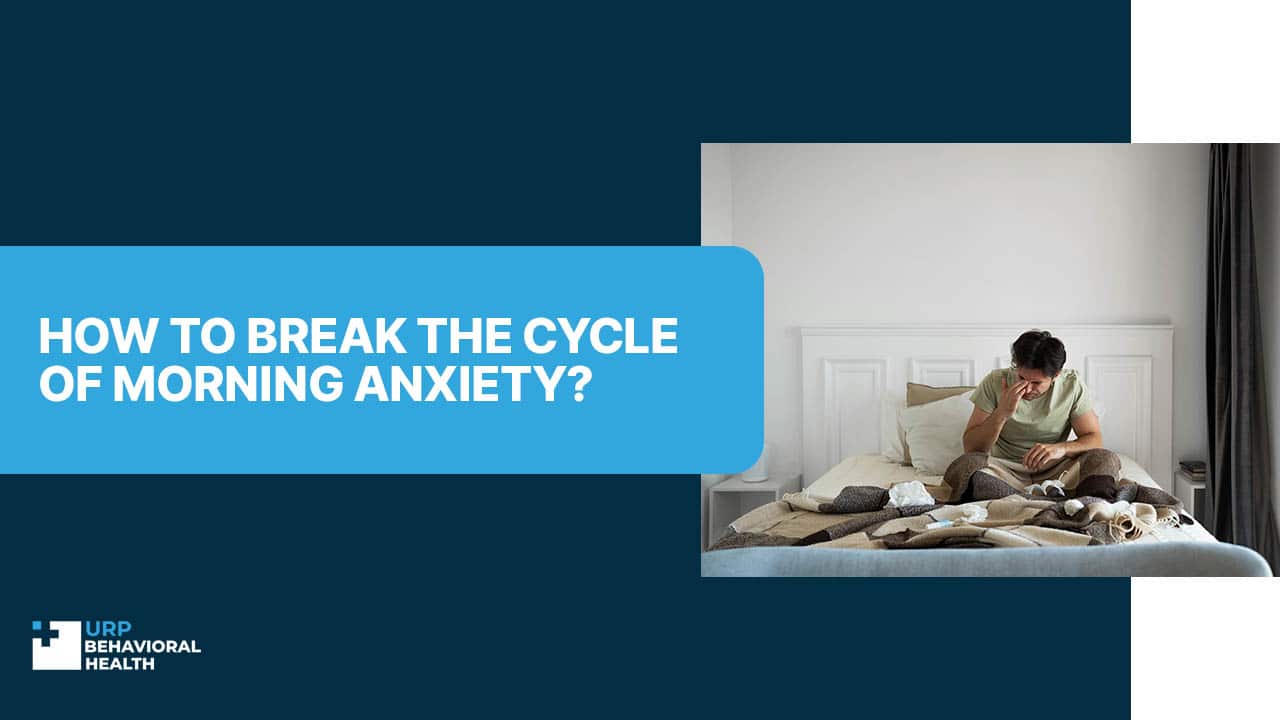
How To Break the Cycle of Morning Anxiety?
Is waking up in the morning with heart palpitations or body tension familiar to you? Unstoppable thoughts of planned activities, fears of what can go wrong, remembering the unfinished business from the last evening. Being stressed out before any stress has actually happened has a significant impact on one’s daily life. Unprovoked anxiety in the morning can become a sad routine, ruining the day ahead. Many people struggle with this peculiar type of worry, even without formal diagnoses of any anxiety disorder. It may be challenging to distinguish it from other mental health conditions because of the overlapping symptoms. However, learning how to get rid of morning anxiety is instrumental in improving life quality. This article explores how this condition manifests, its possible causes, and practical tips for overcoming it.
What Is Morning Anxiety?
Simplistically, the term speaks for itself – feeling worried and restless around morning hours or before one starts their day is referred to as morning anxiety. It usually involves thinking about the day ahead, especially its hard or undesirable aspects. People experience this state usually when still in bed, sometimes barely awake. Some describe it as a feeling of dread in the face of the coming day. [1] However, morning anxiety can be present both with objective reasons to stress about something and without any visible causes at all.
The spectrum of morning anxiety symptoms is quite broad and relates to all levels of human functioning:
- Physical symptoms can include tension in the body, heart racing, knots in the stomach, shallow breathing, and trembling.
- Emotional aspects come from feelings of fear, despair, and being overwhelmed and emotionally dysregulated in general.
- The cognitive aspect relates to ruminating thoughts and images of the coming day, the long list of tasks, or dreading some planned experiences. [2]
Morning anxiety can be just a time-bound expression of the usual symptoms of generalized anxiety disorder (GAD). Being constantly worried without acute triggers means you can get a surge of anxiety from the second you wake up. However, GAD implies that one is likely to be anxious at random hours multiple times daily. The severity of the experience and its impact on daily routines are other distinguishing factors.
Reach out today and let us create a treatment plan designed around your needs.
Causes of Morning Anxiety
While it’s not a defined disorder, morning anxiety can have the same roots as many mental health issues. A combination of several factors is likely at play, with most falling under biological, lifestyle, or psychological causes.
Biological causes
No matter how much people like or dislike the morning hours, our bodies are wired to feel the time change and prepare for the daily stressors. From a biological perspective, humans follow circadian rhythms to differentiate between night and day and regulate their periods of rest and alertness. Cortisol is a hormone that ‘causes’ stress but also increases alertness, boosts energy and helps us to lead active lives. Its levels are regulated by the hypothalamic-pituitary-adrenal (HPA) axis and vary throughout the day. [3]
Cortisol peaks in the early morning hours, preparing the body to wake up in the morning. It’s coordinated with the circadian rhythm of rest and awakening. But there is one more process – cortisol awakening response (CAR), which acts independently from the circadian rhythms. With CAR, cortisol levels peak significantly in the first 30-45 minutes after waking up, whenever it happens. The current hypothesis is that CAR is our body’s way to prepare us for the challenges of the day ahead. [4]
Both circadian cortisol spikes and CAR can increase nervousness and worry about daily activities. With some real struggles in place, these natural mechanisms just add gas to the flames, making anxiety worse in the morning.
Psychological causes
One of the distinctive features of morning anxiety is how strongly it’s tied to our thoughts about the day ahead. It’s perfectly natural to think about upcoming tasks or events, but when these thoughts become overwhelming or emotionally charged, they can trigger intense anxiety and stress right after waking. What we think about and how we interpret those thoughts play a crucial role.
Another common contributor is anticipatory anxiety – the fear or worry about future events or imagined scenarios. It’s not the situation itself that causes distress but the mental rehearsal of everything that could go wrong. This thinking fuels a sense of helplessness and dread, making it especially difficult to start the day with a calm and focused mindset.
Lifestyle causes
It’s no secret that our habits affect our moods and state of mind. If you struggle with anxiety every morning, look closer at how you spent the day and night before. Consuming some substances can cause unwanted arousal even hours later. Excessive caffeine from coffee, tea, or energy drinks savored throughout the day can make one jittery and preoccupied in the morning after. Other widespread external causes are alcohol, late-night smartphone use, and social media scrolling.
Contact our admissions team now to begin your path toward a brighter future.
How to Stop Morning Anxiety
Being more attentive to one’s mental health and overall lifestyle can alleviate some of the anxiety symptoms. It’s important to realize that it may be challenging to stop morning anxiety completely due to its complex and partially biological causes. Addressing several potential causes and triggers holistically should bring noticeable results.
1. Establishing Healthy Routines
Predictable and organized processes for daily activities can reduce stress and restore a sense of control. Waking up at the same time each day, avoiding digital distractions during the first 30 minutes, and setting aside time for simple self-care are good options for the morning. Getting ready for the next day the night before — such as setting out clothes, packing lunch, or writing a to-do list — can ease morning pressure. Starting the day without skipping a well-balanced breakfast of protein and complex carbs helps stabilize blood sugar levels and emotional balance.
2. Decreasing Caffeine and Alcohol Consumption
Cutting down on caffeine in coffee, tea, or energy drinks helps to rebalance one’s nervous system. If one does not intend to avoid such substances completely, gradually decreasing consumption would help as well. The first step should be avoiding such drinks in the evenings, especially the few hours before sleep. Proper hydration to replace or supplement coffee or tea during the day should be sufficient to observe the beneficial change.
3. Exploring Meditation and Breathing Exercises
The human mind is too complex just to command it to stop worrying. People can learn to manage anxiety and cope with it healthily, though. Meditation of any kind or simple breathing techniques can help manage intrusive thoughts that fuel morning anxiety. Practices like body scans, guided meditations, or the 4-7-8 breathing technique help calm the nervous system and accept or gently shift away from racing thoughts. Even five minutes of intentional stillness can make a noticeable difference. Over time, these exercises build emotional resilience and reduce reactivity to stress.
4. Adding Physical Exercises
Tension from daily stressors tends to build up inside human bodies. Physical activity helps to shake the worries off and improve self-regulation. It is one of the most effective natural ways to lower cortisol. [6] Gentle morning activities like walking, stretching, or yoga can help redirect focus from rumination to movement. And it doesn’t have to be a strenuous sport, as even 10–15 minutes can be enough to reset your system. Consistent movement also promotes better sleep and overall mental clarity.
When to Seek Professional Help
If you’re wondering how to deal with severe anxiety in the morning, you may be past the expected level of symptoms. The warning signs include overwhelming anxiety in the morning on most days, a deteriorated quality of life, changes in the usual lifestyle because of anxiety, and struggling with other unpleasant psychological or somatic symptoms. Sometimes, worried thoughts in the morning can be a part of a wider clinical picture that requires anxiety disorders treatment.
Such conditions as generalized anxiety disorder (GAD) or depression can manifest through morning peaks of worry. Ignoring it for too long can lead to the symptoms getting worse with more challenging consequences. Consulting a general practitioner or a psychiatrist is crucial to receiving the necessary help.
Getting slightly excited about the day ahead is natural, though it can become bothersome if one’s thoughts are harmfully colored. Physical symptoms like a racing heartbeat or shallow breathing can spoil any morning. Luckily, minor worry in the morning doesn’t constitute a clinical disorder. It can be managed and alleviated with lifestyle changes, reducing arousing substances, and introducing physical and relaxation activities. However, cases of terrible anxiety in the morning require professional attention.
Don’t wait - confidential help is available right now for you or your loved one.
References:
- Morning Anxiety: Why Do I Get It and How To Cope. (n.d.). Cleveland Clinic. Retrieved 5 April 2025, from https://health.clevelandclinic.org/morning-anxiety
- Andrew Rosen. Morning Anxiety – Starting Your Day Overly Stressed. https://centerforanxietydisorders.com/morning-anxiety/
- Bowles NP, Thosar SS, Butler MP, Clemons NA, Robinson LD, Ordaz OH, Herzig MX, McHill AW, Rice SPM, Emens J and Shea SA (2022) The circadian system modulates the cortisol awakening response in humans. Front. Neurosci. 16:995452. doi: 10.3389/fnins.2022.995452
- Stalder, T., Oster, H., Abelson, J. L., Huthsteiner, K., Klucken, T., & Clow, A. (2025). The Cortisol Awakening Response: Regulation and Functional Significance. Endocrine reviews, 46(1), 43–59. https://doi.org/10.1210/endrev/bnae024
- Colrain, I. M., Nicholas, C. L., & Baker, F. C. (2014). Alcohol and the sleeping brain. Handbook of clinical neurology, 125, 415–431. https://doi.org/10.1016/B978-0-444-62619-6.00024-0
- Exercising to Relax—Harvard Health Publishing. (2011, February 1). Harvard Health. https://www.health.harvard.edu/staying-healthy/exercising-to-relax
















